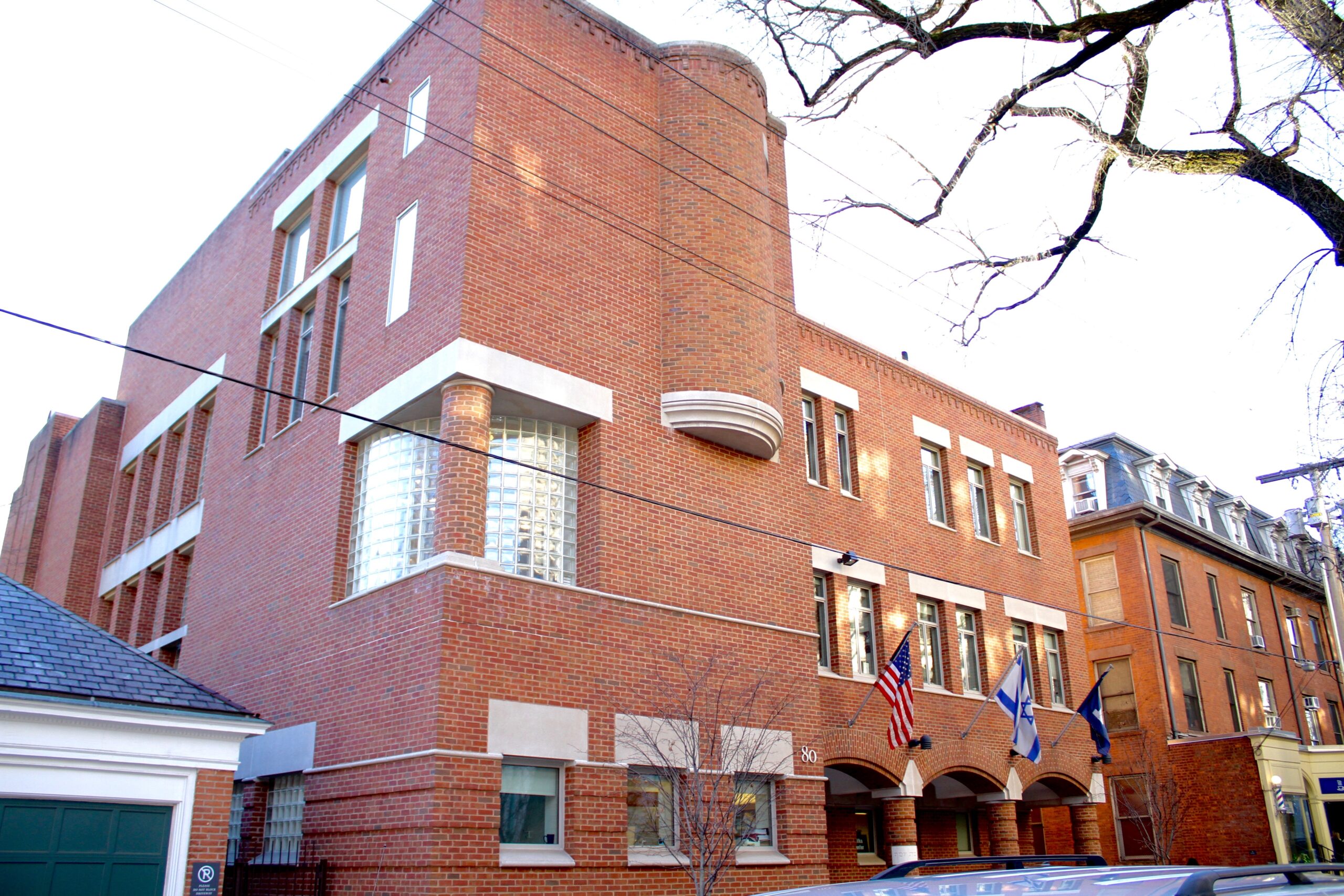Slifka Center hosts book talk on the future of Jewish identity in America
On Tuesday, around 50 people gathered in the Slifka Chapel to hear Joshua Leifer GRD ’27 on his new book, which explores the Jewish history of American exceptionalism and the nebulous future of American Jewry.

Skakel McCooey, Senior Photographer
On Tuesday, the Joseph Slifka Center for Jewish Life at Yale hosted a conversation between Mark Oppenheimer ’96 GRD ’03, a leading Jewish thinker and author, and Joshua Leifer GRD ’27, a current doctoral candidate in the Yale history department, about Leifer’s new book, “Tablets Shattered: The End of an American Jewish Century and the Future of Jewish Life.”
The book, which was published in August, explores the Jewish history of American exceptionalism and the nebulous fate of American Jewry.
“I see the book as an analysis of the problems with Jewish life in America today, and several paths forward, and so it’s part history, part diagnosis of various maladies. It’s as if he’s put the American Jewish people on the analyst’s sofa,” Oppenheimer said.
Before studying history at Princeton, Leifer spent a year in Tel Aviv at a Talmudic study center for secular Israelis who planned on joining the Israeli Defense Forces the following year.
After graduation, Leifer spent time in West Bank settlements reporting for “+972 Magazine,” a progressive Israeli publication. Leifer said that one of his responsibilities for the paper was translating “the Israeli progressive lens” on world affairs into English for consumption by a wider audience.
He noted that since Hamas’ Oct. 7 attack on Israel and the following humanitarian crisis in Gaza, simultaneous commitment to Israeli self-determination while holding Israel accountable for its conduct in Gaza has become an increasingly less common view.
In August, Leifer’s book generated controversy when a Brooklyn bookstore canceled an event with Rabbi Mandy Bachman an hour before it was set to begin. The manager told Leifer, “We don’t want a Zionist on stage.” Bachman and Leifer both champion increased Palestinian civil rights, a two-state solution and an end to the war in Gaza.
Leifer said that he broke contact with left-wing colleagues and friends in October who refused to condemn the murder of Israeli civilians during Hamas’ invasion, who he said excused the murder of 1,200 Israelis and kidnapping of 254 by calling the victims “colonizers.”
In his book, Leifer outlines what he sees as four future paths that American Jewry might take: prophetic protest, the dying establishment, Neo-Reform and separatist Orthodoxy.
Some politically active Jews practice prophetic protest, according to Leifer.
“Someone said to me, the most Jewish I’ve ever felt was during these protests,” Leifer said. “I said, because that’s the only time you try to feel Jewish anymore!”
Leifer noted that “Neo-Reform” Jews might choose to rigorously eschew morally ambiguous texts and that he views plummeting synagogue attendance as a symptom of the “dying establishment” and called for a revival of ritual practice. Lastly, he presented “Separatist Orthodoxy”: robust religious obligation paired with activism.
Max Grinstein ’28 found Leifer to be “thoughtful and well-reasoned” but remained “skeptical of his suggestion that one way for Judaism to continue to thrive is for it to lean into progressivism.”
“As I see it, politicizing Judaism leads different communities to become further siloed, counter to the crucial goals of a pluralistic institution like Slifka,” Grinstein said. “But I recognize that our personal religious visions don’t necessarily reflect the future direction of Judaism more broadly, and I appreciate Leifer’s perspective.”
Zachary Suri ’27 — who is a staff reporter for the News — felt Leifer was excessively pessimistic about American Jewish life.
He added that he advocates for a “healthy synthesis of liberalism and tradition” and implored Jewish institutions to take accountability for this balance.
“I think he is far too cynical about liberalism and Americanism in Jewish life,” Suri said.
The Joseph Slifka Center for Jewish Life is located at 80 Wall St.







